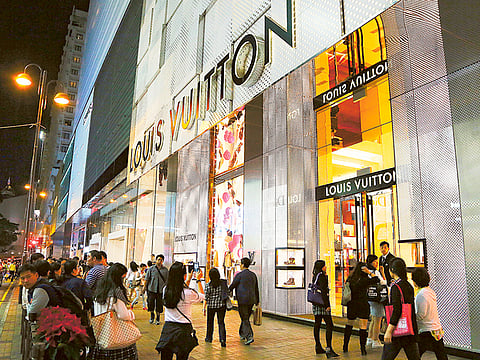Louis Vuitton's owner seems to be doing quite well as Chinese buying rebounds
Most LVMH owned brands are back into growth as luxury sees pent up demand

Paris: The owner of Louis Vuitton enjoyed an unexpected rebound in consumers' appetite for dresses and monogram bags, buoying third-quarter sales. Organic revenue at LVMH's fashion and leather goods unit jumped 12 per cent in the third quarter as the world's largest luxury company cited strong sales of items like Christian Dior's $3,000-and-up Bobby bags.
Some consumers are eager to splurge despite a dire economic backdrop. LVMH's performance shows how its leading brands are helping it weather the pandemic's destructive economic consequences after lockdowns and travel quarantines sent the luxury industry into a deep slump.
China is leading the rebound after it largely eradicated the virus domestically, and wealthy Chinese consumers are seeking comfort in retail therapy given ongoing curbs on international travel. Luxury firms including LVMH, Kering SA and Estee Lauder Cos Inc. reported mid-double digit sales growth in China for the second quarter, while duty-free stores in Hainan recorded a 167 per cent jump in sales during the week-long October national holilday.
A boost for most luxury
The upbeat report by LVMH, the first of the major European luxury players to report quarterly results, bodes well for others in the sector, said Luca Solca, an analyst at Sanford C. Bernstein. "We expect more players to follow this path - most notably Hermes," he said in a note.
LVMH stunned investors when it announced last month that it planned to pull out of a $16 billion deal to buy Tiffany & Co. The US jeweler unveiled positive sales trends in an effort to keep the deal on track.
LVMH's divisions had sharply mixed results in the latest period, with the wines and spirits unit - which houses Hennessy Cognac and Moet & Chandon Champagne - also resisting better than expected. Organic revenue fell 3 per cent, less than half the decline analysts were expecting.
Some take a hit
However, some businesses fared worse. LVMH's selective retailing unit - which includes DFS duty-free outlets and Sephora cosmetics store networks - saw organic revenue slump 29% amid a halt in international tourism.
With travel abroad nearly impossible, Chinese consumers who've driven the luxury industry's growth are spending more at home. Pent-up spending desire during COVID-19 lockdowns earlier this year is also now being unleashed in so-called "revenge shopping".
"Many wealthy Chinese consumers are switching their spending from international travel to luxury purchases," said Amrita Banta, Singapore-based managing director at luxury consultancy Agility Research. "We have seen a lot of interest in more iconic brands and also we have seen people upgrading to the more well-known brands."
Overall demand should continue to grow in the second half and full-year luxury sales in China is projected to rise as much as 30 per cent this year, said the Boston Consulting Group in a September report.
LVMH's total revenue fell 7 per cent on an organic basis, reaching 11.96 billion euros ($14 billion). The company, known for cautious projections, said it remains concerned about the economic outlook as the coronavirus spreads again in key markets including Europe. Still, it said it will maintain marketing spending and other measures aimed at boosting the value of its brands.
"Luxury consumption isn't a proxy for global consumption," Guiony said, cautioning that other sectors may not be similarly resilient.
The quarterly performance was driven largely by smart marketing at key brands such as Louis Vuitton and Dior, said Guillaume Gauville, an analyst at Credit Suisse. "Investors should be careful in extrapolating this beat into other fashion brands," he said in a note.
Sign up for the Daily Briefing
Get the latest news and updates straight to your inbox







